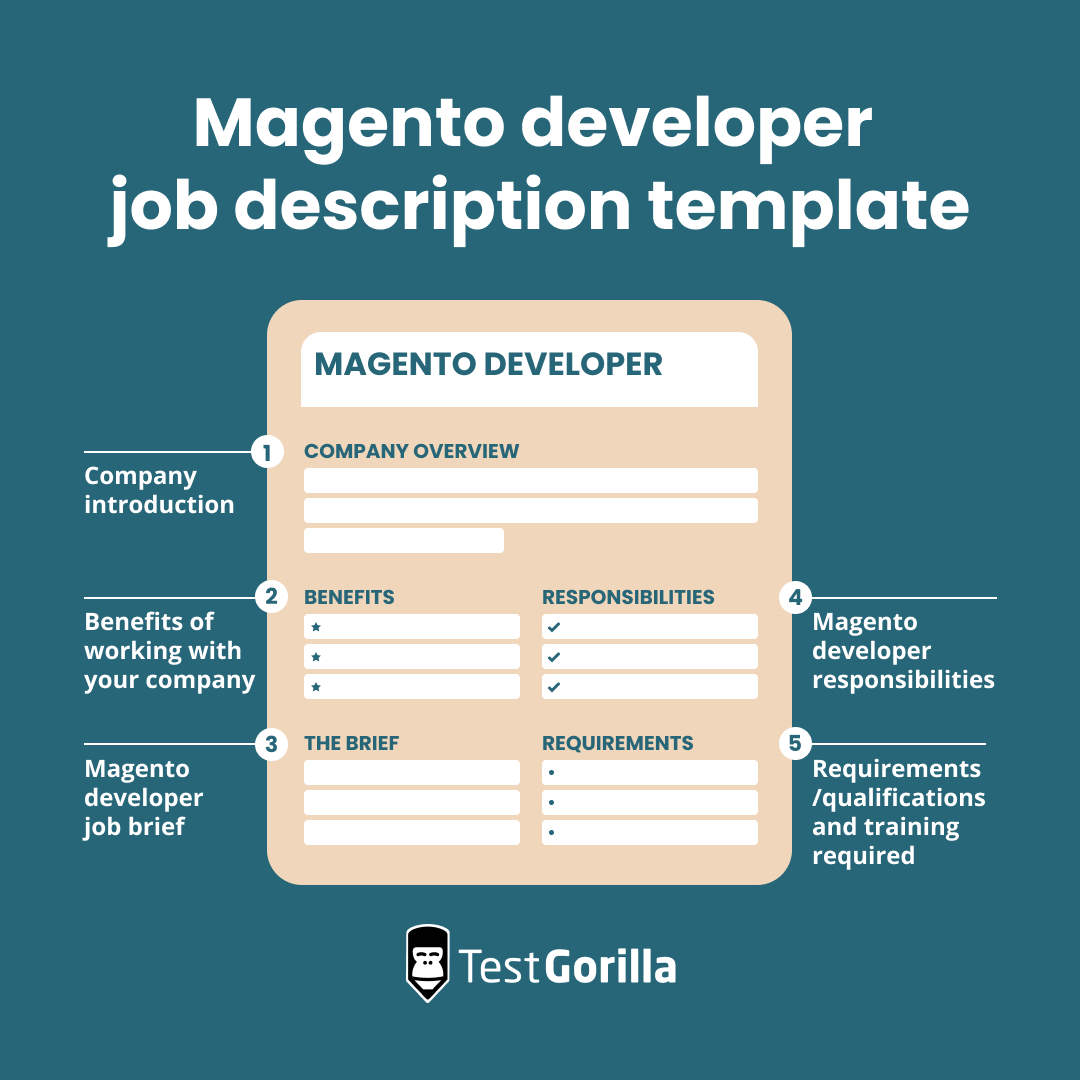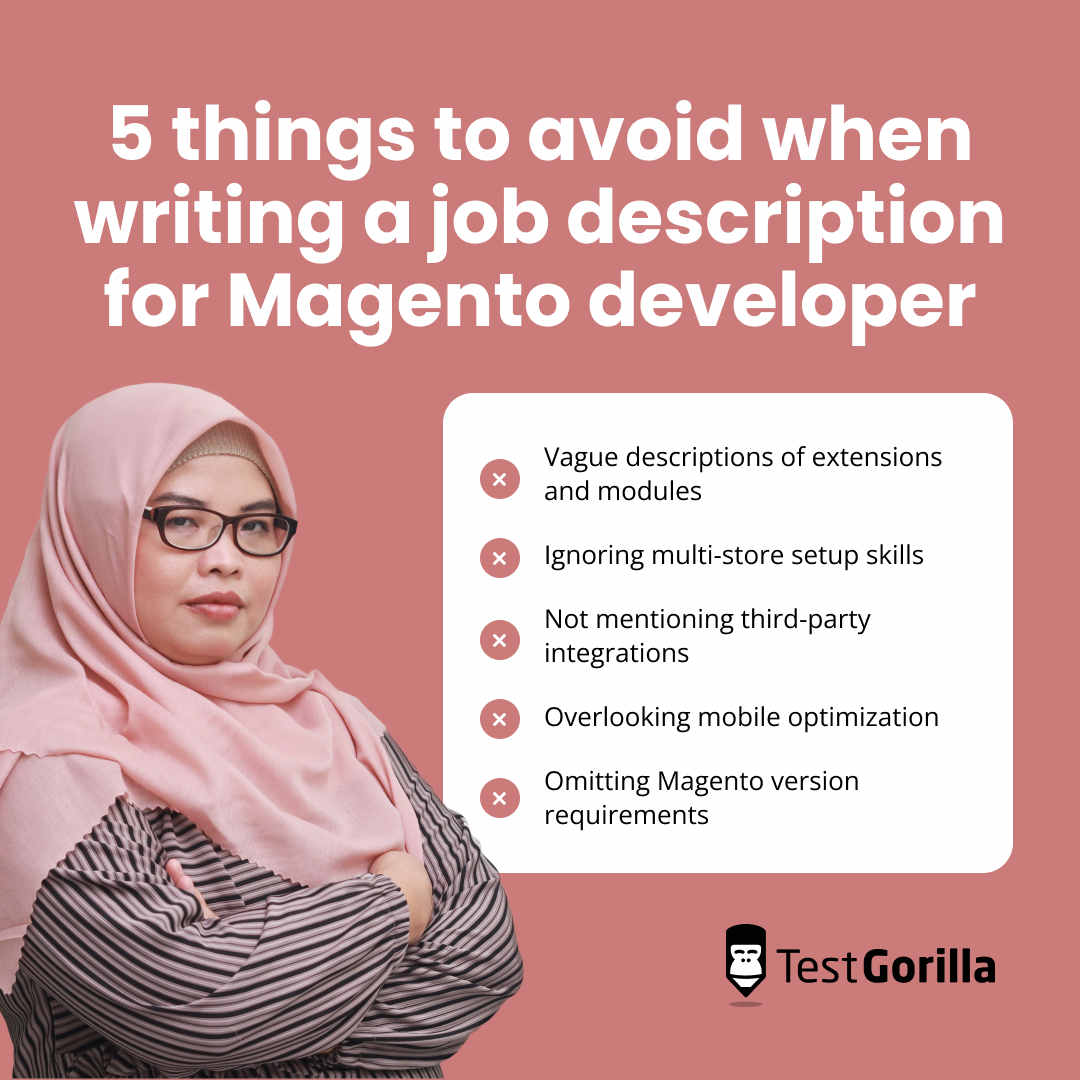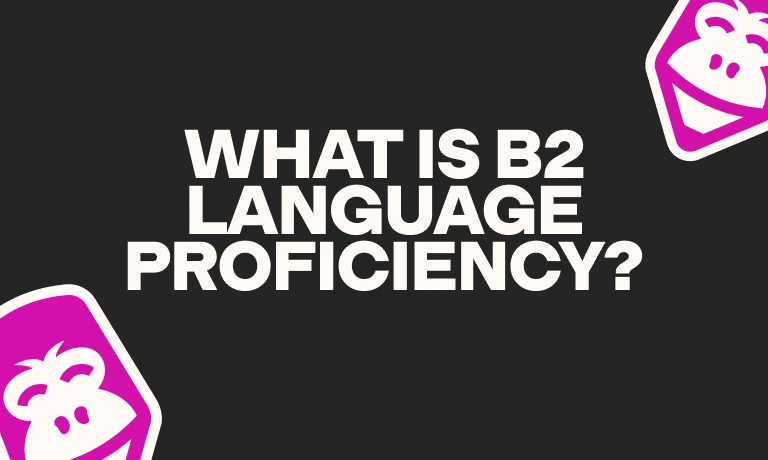Magento developers excel at creating user-friendly online stores, enhancing website speed, and integrating payment gateways with e-commerce platform Magento. But if you hire the wrong person for the job, you might face issues like poor site performance, insecure payment systems, or prolonged downtimes.
Inaccuracies in the job description can also attract unqualified candidates, resulting in subpar e-commerce functionality and a potential loss in sales and customer trust. So getting it right is essential.
In this guide, we'll show you how to draft a precise and engaging job description aimed at top Magento developers. We've even included a Magento developer job description template to get you started.
Table of contents
- What is a Magento developer?
- Key skills to look for in a Magento developer
- How to write an effective Magento developer job description
- Magento developer job description template
- 5 things to avoid when writing a job description for Magento developer
- Next steps: Attracting and assessing Magento developer candidates
- Magento developer job description FAQs
- Finding the best Magento developers with TestGorilla
What is a Magento developer?
A Magento developer works with the Magento e-commerce platform, which allows businesses to sell products and services online. They deal with the architecture, features, and functionalities that make your online shop run smoothly.
These professionals are not just code experts but also understand e-commerce business strategies. They can work in-house or as contractors and usually collaborate with other team members, like UI/UX designers and database administrators.
If you’re actively looking to hire an e-commerce manager, check out our e-commerce manager job description template to kickstart your search.
Key skills to look for in a Magento developer
Before listing your job, you need to know what skills are important for a Magento developer to have:
Magento 2 expertise: Magento 2 is the latest version of the software, and understanding it is critical for performance and security.
PHP programming: PHP is the core programming language on which Magento is built.
Front-end and back-end skills: Knowledge in HTML5, CSS, and JavaScript for front-end development, and server-side scripting for back-end development.
SEO understanding: Basic know-how of search engine optimization (SEO) practices can be beneficial for the site's visibility.
Version control: Experience with tools like Git to track changes and facilitate collaboration.
Troubleshooting skills: Ability to problem solve and fix issues as they arise.
People skills: Being able to clearly communicate technical ideas to non-tech team members is a plus.
The best insights on HR and recruitment, delivered to your inbox.
Biweekly updates. No spam. Unsubscribe any time.
How to write an effective Magento developer job description
There are several things to keep in mind when hiring a Magento developer.
Specify Magento-specific technical skills
Start by listing the technical skills unique to a Magento developer role. This could include experience with Magento 2, PHP, and JavaScript libraries, or Magento's API. It's a good idea to confirm the must-have skills with your team before publishing the job description.
Highlight e-commerce experience
Mention that candidates need to understand user experience, payment gateway integration, and SEO best practices specifically for e-commerce sites. You'll want candidates who not only can code but also understand the challenges of an online retail environment.
Include soft skills tailored to remote work
Due to the ongoing trend of remote work in the tech industry, including soft skills like communication and self-management is important. These skills ensure that your Magento developer can work effectively with less direct oversight and collaborate well in a remote or hybrid setting.
Discuss Magento certifications and ongoing education
Certifications can be a helpful gauge of a candidate's commitment and expertise. Specify if you're looking for developers who have Magento certifications, or if you expect them to obtain one after hiring. Emphasize the importance of continuous learning due to the ever-changing nature of Magento's platform.
Address legal and regulatory compliance
Magento developers often handle sensitive customer data. Make it clear that candidates must be familiar with data protection regulations, like the GDPR, as it relates to e-commerce. This ensures your company remains compliant with the law and builds trust with your customer base.
Magento developer job description template
Company introduction
Outline your company's values, mission, and primary areas of focus. State when your company was founded and its key milestones. Explain how e-commerce, specifically Magento, supports your business goals so candidates can visualize how they will be valued at your business. Briefly describe your company culture so developers can understand why they may want to work for you.
Benefits of working with your company
Talk about the tangible and intangible rewards of being a developer at your firm. This could include competitive pay, wellness reimbursement benefits, and retirement options. Highlight ongoing learning and development opportunities, remote work options, or unique perks like team retreats. Mention aspects like a supportive work culture, work-life balance, and clear paths for career growth.
Magento developer job brief
[Your Company's Name]
Job Title: [For example, Magento Front-End Developer or Magento Cloud Developer]
Reports to: [For example, Head of E-commerce Development]
Position type: [Full-time, part-time, on-site, remote, or hybrid]
[Salary and compensation details]
Magento developer responsibilities
Creating and customizing Magento themes and modules
Collaborating with front- and back-end developers to optimize user experience
Integrating multiple payment gateways, databases, and third-party services
Keeping up to date with the latest trends in Magento development and e-commerce strategies
[Add other responsibilities based on your company's specific needs]
Magento developer requirements/qualifications and training required
Bachelor’s degree in computer science, web development, or a similar field
Demonstrable experience in Magento 2 development
Familiarity with PHP, JavaScript, HTML, and CSS
Understanding of SEO best practices and payment gateway integration for e-commerce
[Add other qualifications based on your company's specific needs]
5 things to avoid when writing a job description for Magento developer
Writing a Magento developer job description comes with a few challenges. Here are five pitfalls to avoid:
Vague descriptions of extensions and modules: Just mentioning "extensions" or "modules" is too vague. Specify if the developer will create custom extensions or work with existing ones, for example.
Ignoring multi-store setup skills: Magento has unique multi-store capabilities. If your business uses or plans to use this feature, it must be in the job description.
Not mentioning third-party integrations: Magento often requires integration with customer relationship management (CRM), supply chain management systems, or payment gateway systems. Hiring developers with experience of the third-party integrations you use is advantageous.
Overlooking mobile optimization: As e-commerce shifts towards mobile, experience with responsive design for Magento is essential. Don’t assume it’s a given.
Omitting Magento version requirements: Failing to specify whether the role requires experience with Magento 1 or Magento 2 can lead to hiring a developer with outdated skills.
Next steps: Attracting and assessing Magento developer candidates
After drafting your Magento developer job description and posting it online, you'll need to evaluate the candidates you get.
To effectively assess Magento developers' skills, combine job-specific and personality tests using TestGorilla for a comprehensive view of the candidate. Consider a combination of these tests:
There are over 320 TestGorilla tests to choose from, so it's easy to make the perfect assessment for your Magento developer applicants.
Magento developer job description FAQs
What are the roles and responsibilities of a Magento front-end developer?
A Magento front-end developer focuses on the visual and user interface aspects of a Magento website. Responsibilities include customizing themes, improving site responsiveness, and enhancing user experience with front-end technologies like HTML, CSS, and JavaScript.
What is the average salary of a Magento developer?
The average salary of a Magento developer can vary widely depending on location and experience. In the United States, it ranges from $70,000 to $110,000 per year.
Finding the best Magento developers with TestGorilla
With a detailed and specific Magento developer job description, you'll draw in high-quality candidates for your role with the aptitude to make your e-commerce projects a success.
Once you've attracted potential hires, TestGorilla's comprehensive pre-employment tests offer insights into their technical expertise and personal qualities, giving you a fuller understanding of each candidate.
By blending tests that evaluate Magento-specific skills with those that measure cognitive and personality traits, you can create a customized assessment that matches the demands of your Magento developer role. With this, you’ll be able to make the right candidate choice.
Get started with TestGorilla's Free plan, or explore its features further with a product tour.
You've scrolled this far
Why not try TestGorilla for free, and see what happens when you put skills first.
















